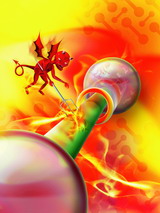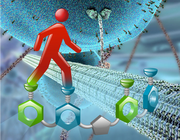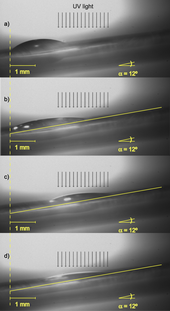David A. Leigh 学术报告---海外名师大讲堂
题 目 Making the Tiniest Machines
时 间
地 点 玉泉校区 教八-218
报告人 David A. Leigh
单 位 School of Chemistry, University of Edinburgh
 |  |  |
Over the past few years some of the first examples of synthetic molecular level machines and motors—all be they primitive by biological standards—have been developed. These molecules respond to light, chemical and electrical stimuli, inducing motion of interlocked components held together by hydrogen bonding or other weak molecular interactions.
Perhaps the best way to appreciate the technological potential of controlled molecular-level motion is to recognise that nanomotors and molecular-level machines lie at the heart of every significant biological process. Over billions of years of evolution Nature has not repeatedly chosen this solution for achieving complex task performance without good reason. In stark contrast to biology, none of mankind’s fantastic myriad of present day technologies exploit controlled molecular-level motion in any way at all: every catalyst, every material, every polymer, every pharmaceutical, every chemical reagent, all function exclusively through their static or equilibrium dynamic properties. When we learn how to build artificial structures that can control and exploit molecular level motion, and interface their effects directly with other molecular-level substructures and the outside world, it will potentially impact on every aspect of functional molecule and materials design. An improved understanding of physics and biology will surely follow.
Selected papers from the Leigh group:
• (Review) "Synthetic Molecular Motors and Mechanical Machines" Angew Chem Int Ed, 46, 72-191 (2007).
• "A Synthetic Small Molecule That Can Walk Down a Track" Nature Chem, 2, 96-101 (2010) • "Operation Mechanism of a Molecular Machine Revealed Using Time-Resolved Vibrational Spectroscopy" Science, 328, 1255-1258 (2010) • "Hybrid Organic-Inorganic Rotaxanes and Molecular Shuttles" Nature, 458, 314-318 (2009) • "A Molecular Information Ratchet" Nature, 445, 523-527 (2007) • "Lighting Up Nanomachines" Nature, 440, 286-287 (2006) • "Macroscopic Transport by Synthetic Molecular Machines" Nature Mater, 4, 704-710 (2005) • "A Reversible Synthetic Rotary Molecular Motor" Science, 306, 1532-1537 (2004) • "Unidirectional Rotation in a Mechanically Interlocked Molecular Rotor" Nature, 424, 174-179 (2003) • "Information Storage using Supramolecular Surface Patterns" Science, 299, 531 (2003) • "Photoinduction of Fast, Reversible Translational Motion in a Hydrogen-Bonded Molecular Shuttle" Science, 291, 2124-2128 (2001) • "Influencing Intramolecular Motion with an Alternating Electric Field" Nature, 406, 608-611 (2000).
欢 迎 参 加!

